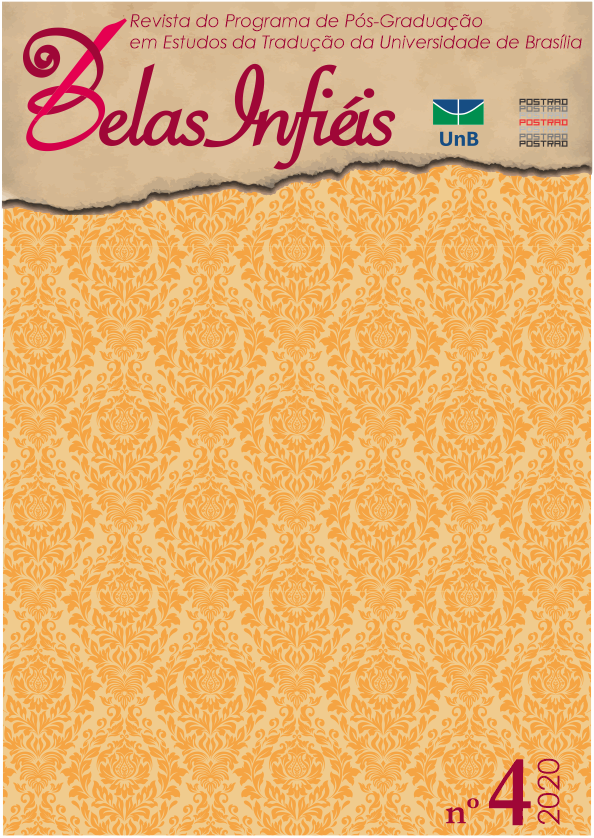Translation/Localization of Videogames: Mapping the Research Carried out in Brazilian Universities between 1998 and 2018
DOI:
https://doi.org/10.26512/belasinfieis.v9.n4.2020.27155Keywords:
Mapping. Localization. Translation. Video games. Globalization. MapTrad.Abstract
Localization has gained momentum because of globalization and market needs to provide products that are more oriented to the target culture in different countries and, therefore, more easily embraced by the target audience. This article integrates the studies proposed by the research group Mapping in Translation (MapTrad), which has carried out research aiming to expand the studies originally reported in Pagano and Vasconcellos (2003) and Alves and Vasconcellos (2013). As a purely descriptive, function-oriented study within Translation Studies, it aims to report on a mapping of the academic production on the localization and translation of video games that is linked to Brazilian higher education institutions (HEI) in the period from 1998 through 2018. It is based on the methodology proposed by Pagano and Vasconcellos (2003) and replicated by Alves and Vasconcellos (2016), all of whom mapped the Translation Studies in Brazil. This study is relevant to understand the status of the Brazilian academic production on the subject at both master’s and doctorate levels, to identify research niches that have not been explored, and to promote a dialogue between the academia and the market. The results show a deficit of studies on the localization of videogames despite the increased number of studies on translation in general.
Downloads
References
ADAMS, Ernest. Fundamentals of game design. 2. ed. Berkeley: New Riders, 2009.
ALVES, Daniel; VASCONCELLOS, Maria Lúcia. Metodologias de pesquisa em Estudos da Tradução: uma análise bibliométrica de teses e dissertações produzidas no Brasil entre 2006-2010. D.E.L.T.A., São Paulo, v. 32, n. 2, p. 375-404, 2016. doi: https://doi.org/10.1590/0102-4450827796709063513
BAKER, Mona; SALDANHA, Gabriela. Routledge Encyclopedia of Translation Studies. New York: Routledge, 2009. doi: https://doi.org/10.4324/9780203872062
BERNAL-MERINO, Miguel Á. A brief history of game localisation. TRANS. Revista de Traductología, Málaga, n. 15, p. 11-17, 2011. doi: https://doi.org/10.24310/TRANS.2011.v0i15.3191
BRAZIL games market 2018. Newzoo, 6 jul. 2018. Disponível em: https://newzoo.com/insights/infographics/brazil-games-market-2018/. Acesso em: 2 mar. 2018.
CHANDLER, Heather Maxwell; DEMING, Stephanie O'Malley. The Game Localization Handbook. 2. ed. Sudbury: Jones & Bartlett Learning, 2012.
COLETTI, Bruna Luizi; MOTTA, Lennon. A localização de games no Brasil ”“ Um ponto de vista prático. In-traduções, Florianópolis, v. 0, n. 5, p. 1-12, nov. 2013.
FORNAZARI, Meggie Rosar. Localization practices in trading card games: Magic The Gathering from English into Portuguese. 2014. Dissertação (Mestrado em Inglês: Estudos Linguísticos e Literários) ”“ Universidade Federal de Santa Catarina (UFSC), Florianópolis, 2014.
HOLMES, James S. The name and nature of translation studies. In: VENUTI, L. (Ed.) The Translation Studies Reader. 2. ed. Londres/Nova York: Routledge, 2004. p. 180-192.
LEIMONTAS, Renan Abdalla. Eu vou equalizar sua cara: análise da localização do video game Mortal Kombat X. 2017. 136f. Mestrado (Estudos da Tradução) ”“ Centro de Comunicação e Expressão, Universidade Federal de Santa Catarina, Florianópolis, 2017.
LONG, Jixing. Translation definitions in different paradigms. Canadian Social Science, Québec, v. 9, n. 4, p. 107-115, 2013.
MALTA, Gleiton; BARCELLOS, Luiz Gustavo Nogueira. A localização em jogo na tradução de games. Tradterm, v. 32, p. 116-137, 2018. doi: https://doi.org/10.11606/issn.2317-9511.v32i0p116-137
NEWMARK, Peter. A textbook of translation. New York: Prentice Hall, 1988.
NOVAK, Jeannie. Game development essentials. 3. ed. Clifton Park: Delmar Cengage Learning, 2012.
PACHECO, Paula. Mercado nacional de games deve movimentar mais de US$ 1,5 bilhão em 2018. Correio Braziliense, 24 jul. 2018. Disponível em: https://www.correiobraziliense.com.br/app/noticia/economia/2018/07/24/internas_economia,696929/mercado-nacional-de-games-deve-movimentar-mais-de-us-1-5-bilhao-em-20.shtml. Acesso em: 2 mar. 2020.
PAGANO, Adriana S.; VASCONCELLOS, Maria Lúcia. Estudos da tradução no Brasil: reflexões sobre teses e dissertações elaboradas por pesquisadores brasileiros nas décadas de 1980 e 1990. D.E.L.T.A., São Paulo, v. 19, n. spe, p. 1-25, 2003. doi: https://doi.org/10.1590/S0102-44502003000300003
PETRÓ, Gustavo. No Brasil, empresas investem em jogos traduzidos para o português. G1, 19 mar. 2011. Disponível em: http://g1.globo.com/tecnologia/noticia/2011/03/no-brasil-empresas-investem-em-jogos-traduzidos-para-o-portugues.html. Acesso em: 2 mar. 2020.
ROLLINGS, Andrew; MORRIS, David. Game architecture and design: a new edition. Indianapolis: New Riders, 2004.
SCHÄLER, Reinhard. Localization. In: BAKER, Mona (Ed.). Routledge encyclopedia of translation studies. London/New York: Routledge, 1998. p. 157-161.
SILVA, Hemanoel Mariano Sousa e. O estado da arte da localização/tradução de videogames. 2018. 82f. Dissertação (Mestrado em Estudos da Tradução) ”“ Universidade Federal do Ceará, Fortaleza (CE), 2018.
SILVA, Fernando. The mapping of localized contents in the videogame inFamous 2: a multimodal corpus-based analysis. 2016. 307f. Doutorado (Estudos da Tradução) ”“ Centro de Comunicação e Expressão, Universidade Federal de Santa Catarina, Florianópolis, 2016.
SOUZA, Ricardo Vinicius Ferraz. Tradução e videogames: uma perspectiva histórico-descritiva sobre a localização de games no Brasil. 2015. 395f. Dissertação (Mestrado em Estudos da Tradução) - Faculdade de Filosofia, Letras e Ciências Humanas, Universidade de São Paulo, 2015.
VIDEOGAMES fazem frente à poderosa indústria cinematográfica. Correio Braziliense, 30 jul. 2015. Disponível em: https://www.correiobraziliense.com.br/app/noticia/diversao-e-arte/2015/07/30/interna_diversao_arte,492553/videogames-fazem-frente-a-poderosa-industria-cinematografica.shtml Acesso em: 2 mar. 2020.
Downloads
Published
How to Cite
Issue
Section
License
Copyright (c) 2020 CC BY

This work is licensed under a Creative Commons Attribution 4.0 International License.
Given the public access to this journal, the texts are free to use but requires the recognition of the original authorship and initial publication in this journal to be properly stated.
 The journal allows the use of works published for non-commercial purposes, including the right to submit the work to publicly accessible databases. Published contributions are the sole and exclusive responsibility of the author(s).Â



















